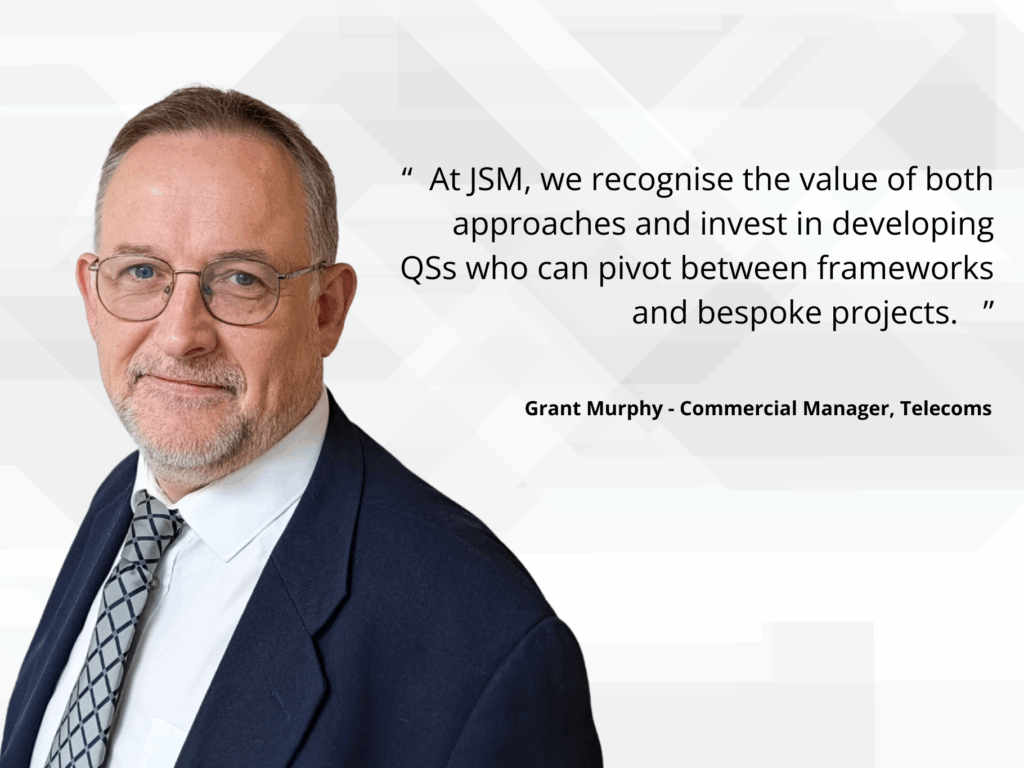Grant Murphy brings a wealth of expertise and leadership to his role as Commercial Manager at JSM Group, where he has been a key figure for over 14 years. His career spans nearly three decades, marked by progressive roles in quantity surveying, project management, and commercial strategy across major infrastructure sectors.
In the dynamic world of telecommunications infrastructure, Quantity Surveyors (QSs) play a pivotal role in ensuring commercial viability, cost control, and contractual compliance. However, the nature of their responsibilities can vary significantly depending on whether they are operating within a framework agreement or managing stand-alone projects. Understanding these differences is essential for both aspiring QSs and industry stakeholders seeking to optimise delivery models.
Framework agreements: structure, scale, and standardisation
Framework agreements in telecommunications, often established with major network operators or government bodies, are designed to streamline procurement and delivery across multiple projects over a fixed term. For QSs working within these frameworks, the requirements tend to be:
-
Standardised processes and pricing models
QSs must navigate pre-agreed rates, scopes, and commercial mechanisms. This demands a deep understanding of schedule of rates (SORs), KPIs, and performance-linked incentives. -
Volume-based cost management
With frameworks covering hundreds or thousands of sites, QSs focus on trend analysis, cost benchmarking, and economies of scale. Accuracy in forecasting and reporting is critical. -
Collaborative stakeholder engagement
Frameworks involve long-term relationships with clients, subcontractors, and internal teams. QSs must be adept at managing expectations, resolving disputes, and maintaining consistency across regions. -
Compliance and governance
QSs are expected to uphold rigorous audit trails, adhere to framework-specific governance protocols, and ensure alignment with overarching commercial strategies.
Stand-alone projects: flexibility, focus, and forensics
In contrast, stand-alone telecommunications projects (such as bespoke fibre rollouts, network overlays, or large diversionary works) require a different QS skillset:
-
Tailored commercial strategy
QSs must build project-specific budgets, negotiate bespoke contracts, and manage unique risk profiles. Flexibility and commercial creativity are key. -
Detailed cost planning and control
With no standardised pricing, QSs must conduct granular cost analysis, validate supplier quotes, and manage change control with precision. -
Hands-on project involvement
QSs often work closely with site teams, engineers, and clients, providing real-time commercial support and adapting to evolving project scopes. -
End-to-end lifecycle management
From tendering to final account, QSs on stand-alone projects oversee the full commercial journey, requiring strong documentation and negotiation skills.
Bridging the gap
While both roles demand core QS competencies – cost management, contract administration, and stakeholder engagement – the context in which these skills are applied differs markedly. Framework QSs thrive on consistency, scale, and process optimisation. Stand-alone QSs excel in adaptability, detail, and strategic thinking.
At JSM, we recognise the value of both approaches and invest in developing QSs who can pivot between frameworks and bespoke projects. This versatility not only enhances career progression but also strengthens our commercial resilience in a fast-evolving telecoms landscape.
Check out the latest Quantity Surveyor vacancies at JSM


